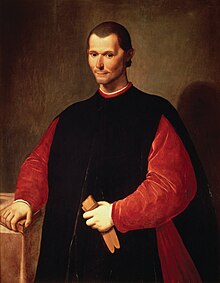For President Donald Trump and Congressional Republicans, the single greatest achievement of their time in office was to drastically cut taxes on the wealthy (including themselves).
It’s a view that Niccolo Machiavelli would dispute.
In 1513, Machiavelli, the Florentine statesman who has been called the father of modern political science, published his best-known work: The Prince.

Niccolo Machiavelli
Among the issues he confronted was how to preserve liberty within a republic. And key to this was mediating the eternal struggle between the wealthy and the poor and middle class.
Machiavelli deeply distrusted the nobility because they stood above the law. He saw them as a major source of corruption because they could buy influence through patronage, favors or nepotism.
Successful political leaders must attain the support of the nobility or general populace. But since these groups have conflicting interests, the safest course is to choose the latter.
Writes Machiavelli:
….He who becomes prince by help of the [wealthy] has greater difficulty in maintaining his power than he who is raised by the populace. He is surrounded by those who think themselves his equals, and is thus unable to direct or command as he pleases.
But one who is raised to leadership by popular favor finds himself alone, and has no one, or very few, who are not ready to obey him. [And] it is impossible to satisfy the [wealthy] by fair dealing and without inflicting injury upon others, whereas it is very easy to satisfy the mass of the people in this way.
Machiavelli warns that the general populace is more honest than the nobility—i.e., wealthy. The wealthy seek to oppress, while the populace wants to simply avoid oppression.
A political leader cannot protect himself against a hostile population, owing to their numbers, but he can against the hostility of the great, as they are but few.
The worst that a prince has to expect from a hostile people is to be abandoned, but from hostile nobles he has to fear not only desertion but their active opposition. And as they are more far seeing and more cunning, they are always in time to save themselves and take sides with the one who they expect will conquer.
The prince is, moreover, obliged to live always with the same people, but he can easily do without the same nobility, being able to make and unmake them at any time, and improve their position or deprive them of it as he pleases.
Unfortunately, political leaders throughout the world—including the United States–have ignored this sage advice.
In 2012, Tax Justice Network, which campaigns to abolish tax havens, commissioned a study of their effect on the world’s economy.
The study was entitled, “The Price of Offshore Revisited: New Estimates for ‘Missing’ Global Private Wealth, Income, Inequality and Lost Taxes.”
http://www.taxjustice.net/cms/upload/pdf/Price_of_Offshore_Revisited_120722.pdf
The research was carried out by James Henry, former chief economist at consultants McKinsey & Co. Among its findings:
- By 2010, at least $21 to $32 trillion of the world’s private financial wealth had been invested virtually tax-free through more than 80 offshore secrecy jurisdictions.
- Since the 1970s, with eager (and often aggressive and illegal) assistance from the international private banking industry, private elites in 139 countries had accumulated $7.3 to $9.3 trillion of unrecorded offshore wealth by 2010.
- This happened while many of those countries’ public sectors were borrowing themselves into bankruptcy, suffering painful adjustment and low growth, and holding fire sales of public assets.
- The assets of these countries are held by a small number of wealthy individuals while the debts are shouldered by the ordinary people of these countries through their governments.
- The offshore industry is protected by pivate bankers, lawyers and accountants, who get paid handsomely to hide their clients’ assets and identities.
-
Bank regulators and central banks of most countries allow the world’s top tax havens and banks to hide the origins and ownership of assets under their supervision.
- Although multilateral institutions like the Bank for International Settlements (BIS), the IMF and the World Bank are supposedly insulated from politics, they have been highly compromised by the collective interests of Wall Street.
- These regulatory bodies have never required financial institutions to fully report their cross-border customer liabilities, deposits, customer assets under management or under custody.
- Less than 100,000 people, .001% of the world’s population, now control over 30% of the world’s financial wealth.
- Assuming that global offshore financial wealth of $21 trillion earns a total return of just 3% a year, and would have been taxed an average of 30% in the home country, this unrecorded wealth might have generated tax revenues of $189 billion per year.
Summing up this situation, the report noted: “We are up against one of society’s most well-entrenched interest groups. After all, there’s no interest group more rich and powerful than the rich and powerful.”
Fortunately, Machiavelli has supplied timeless remedies to this increasingly dangerous situation:
- Assume evil among men—and most especially among those who possess the greatest concentration of wealth and power.
- Carefully monitor their activities—the way the FBI now regularly monitors those of the Mafia and major terrorist groups.
- Ruthlessly prosecute the treasonous crimes of the rich and powerful—and, upon their conviction, impose severe punishment.



















